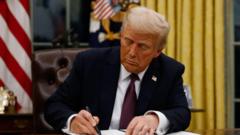As Peter Dutton positions himself as a contender to Prime Minister Anthony Albanese, he employs strategies reminiscent of Donald Trump, focusing on a critique of "woke" initiatives and economic issues. Despite this alignment, the Australian electorate presents distinct challenges that could influence the success of his campaign.
Australian Opposition Leader Adopts Familiar Tactics Amid Election Season

Australian Opposition Leader Adopts Familiar Tactics Amid Election Season
Peter Dutton's campaign strategy mirrors that of Donald Trump, targeting "woke" culture while addressing economic concerns, but faces unique Australian political landscape challenges.
In the lead-up to Australia’s federal elections, which must be held by May 17, opposition leader Peter Dutton has embraced a campaign strategy that bears a resemblance to the familiar tactics used by Donald Trump. This “Trump lite” approach includes an energetic critique of so-called “woke” culture, which Dutton believes distracts from pressing economic issues such as inflation and housing affordability.
Dutton has targeted a range of institutions he refers to as part of a “woke brigade,” which includes banks, supermarkets, and even pubs that advocate for environmental and Indigenous rights. In a bid to rally support, he has expressed concerns about young men feeling marginalized by pro-diversity initiatives, positioning his campaign as a voice for those who feel overlooked in the current socio-political climate.
Prime Minister Anthony Albanese, facing growing criticism over rising costs of living in the wake of the COVID-19 pandemic, has attempted to address inflation with policies including tax cuts aimed at easing financial burdens on citizens. However, a recent NewsPoll survey indicated that Dutton's rhetoric may be resonating, as Albanese's approval ratings dipped to a low not seen since he assumed office in 2022. The poll revealed that 57% of respondents disapproved of Albanese’s performance, indicating a tightening race as Dutton's message gains momentum.
This shift in sentiment reflects not only Dutton's strategic campaign positioning but also a growing frustration within the electorate regarding economic management. Dutton's ascent in public support may signal that his adaptation of Trump's playbook is proving effective to some extent within the unique context of Australian politics, as he navigates an electorate that remains sensitive to local issues, rather than directly mirroring American sentiments.
As the election date approaches, the effectiveness of Dutton's strategy against the backdrop of a distinctive Australian political landscape remains to be seen, particularly as the electorate's priorities evolve amid ongoing economic challenges. The outcome will likely hinge on his ability to balance broadening his appeal without alienating voters who may not embrace the extreme aspects of the Trumpian approach.





















